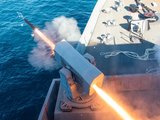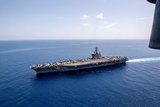Iranian tanker incident worsens regional maritime security situation
An incident involving an Iranian oil tanker near the port city of Jeddah, initially described as having been caused by missiles fired by Saudi Arabia, is another marker point in a deteriorating Middle East maritime security map.
The IRNA, the Iranian state news agency, initially reported that the oil tanker Sabiti, owned by the National Iranian Tankers Company, sustained damage after being hit by missiles fired by Saudi Arabia while transiting the Red Sea in the early hours of 11 October.
However, hours later Iranian state news distanced itself from reports describing the explosions suffered by the vessel as
Already have an account? Log in
Want to keep reading this article?
More from Naval Warfare
-
![European navies line up $105.8 billion in unawarded contracts for 2026]()
European navies line up $105.8 billion in unawarded contracts for 2026
France, Germany and Italy lead the way on unawarded naval defence opportunities that could be awarded this year, but across Europe countries are ramping up their spending efforts to face geopolitical challenges.
-
![Spain’s F100 upgrade mirrors Aegis modernisation paths in allied navies]()
Spain’s F100 upgrade mirrors Aegis modernisation paths in allied navies
The Spanish Navy’s Alvaro de Bazan-class of air defence frigates will receive the latest Aegis Weapon System technology among other modernisations to extend the service life to 2045.
-
![UK’s Fleet Solid Support ship programme deemed on track despite steel supply concerns]()
UK’s Fleet Solid Support ship programme deemed on track despite steel supply concerns
Shipbuilders are saying the programme is going ahead on time as the government estimates 7.7 million tonnes of steel are needed for 2026 infrastructure projects.
-
![Raytheon unveils details of its proposal for the US Navy/NATO ESSM Next Significant Variant]()
Raytheon unveils details of its proposal for the US Navy/NATO ESSM Next Significant Variant
In an exclusive interview with Shephard, Raytheon’s VP of Shipboard Missiles disclosed what improvements the company plans to offer for the Sea Sparrow NSV.






















